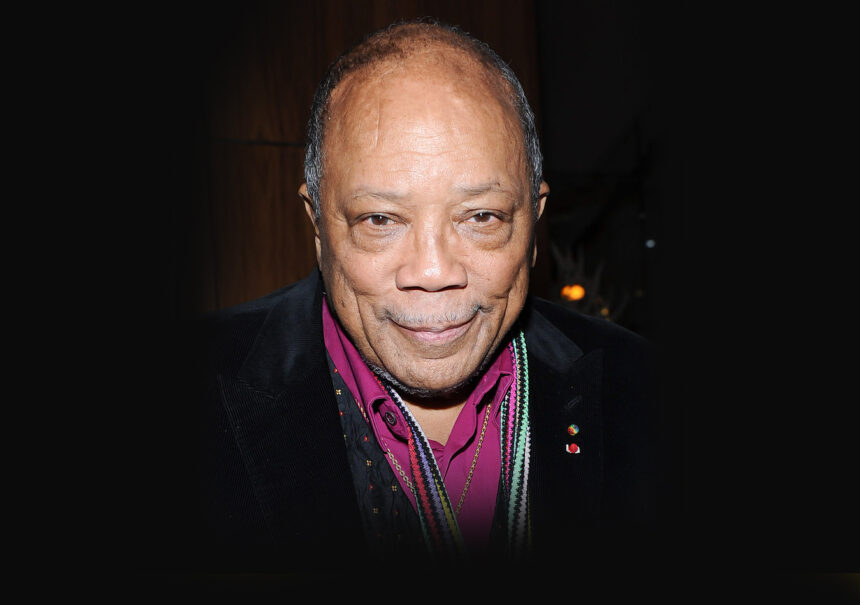The world of music fell silent Sunday as news broke of the passing of Quincy Jones, a towering figure whose influence has shaped the very essence of modern pop and soul. The legendary composer, producer, and visionary behind Michael Jackson’s Thriller has died at 91, his publicist confirmed.
Born in Chicago on March 14, 1933, Quincy Delight Jones Jr. was destined for greatness. With a deep love for music, he began as a trumpet player and arranger before catching the eye of greats like Count Basie and Frank Sinatra. By the time he was scoring films in the 1960s, he had already mastered jazz and big band, working with everyone from Ray Charles to Dizzy Gillespie.
But when he met a young Michael Jackson, history was written in gold. Together, they revolutionized pop, blending rock, funk, and soul in a way that electrified audiences and set new benchmarks for the industry. Jackson’s Off the Wall (1979), Thriller (1982), and Bad (1987) stand as monuments to their creative partnership.
From the swinging streets of 1950s Paris to the neon-lit spectacle of Thriller, his genius knew no limits, and the world listened.
For over seven decades, Quincy Jones transcended boundaries, transforming from a jazz wunderkind into the musical mastermind who crafted the sonic backdrop of generations. His legacy is stitched into the DNA of American music, an unbreakable thread weaving through jazz, R&B, pop, and hip-hop.
Jones, who collected accolades with effortless grace, wasn’t just a star-maker—he was a legend himself. Thriller remains the highest-selling album of all time, a testament to his gift for translating raw talent into cultural phenomena. Hits like “Billie Jean,” “Beat It,” and “Thriller” are embedded into the global soundtrack, songs that don’t just echo on the radio but dance through the collective memory of the world.
Jones’s versatility knew no limits. He was one of the first Black composers to break into Hollywood film scoring, earning acclaim for movies like The Pawnbroker and In the Heat of the Night. A true Renaissance man, he was a pioneer who helped bring Black artistry to the mainstream, forging paths for others to follow.
In 1990, Quincy Jones Productions joined with Time Warner to create Quincy Jones Entertainment (QJE). The company signed a 10-picture deal with Warner Bros. and a two-series deal with NBC Productions, now Universal Television. Jones went on to produce The Fresh Prince of Bel-Air, discovering Will Smith and launching the show’s monumental success. He also produced In the House for UPN, The Jenny Jones Show in association with Telepictures Productions, and MADtv, which ran for 14 seasons on FOX.
Around this time, he also embarked on an ambitious project called “The Evolution of Black Music” and launched a weekly talk show hosted by his friend, Reverend Jesse Jackson.
Expanding his influence, Jones founded Vibe magazine, championed humanitarian efforts like We Are the World, and mentored countless artists. His presence loomed large at every award show—an EGOT winner with 28 Grammys, including the Grammy Legend Award in 1992, one of only 15 people ever to receive it. He currently holds the third spot in all-time Grammy wins.
Jones was honored with numerous awards throughout his life, including an Honorary Doctorate of Music from Berklee College of Music (1983), the Golden Plate Award from the American Academy of Achievement (1984), the Humanitarian Award at the BET Awards (2008), and the National Medal of Arts, which he received from President Barack Obama in 2011.
His alma mater, Garfield High School in Seattle, named its performing arts center after him, and Quincy Jones Elementary School in Los Angeles bears his name.
Other honors included the John F. Kennedy Center Honors (2001), the Los Angeles Press Club Visionary Award (2014), an honorary doctorate from the Royal Academy of Music in London (2015), the Ahmet Ertegun Award from the Rock and Roll Hall of Fame (2013), and his induction into the Black Music & Entertainment Walk of Fame as a foundational inductee in 2021.
He was a storyteller, a seeker of cultural connections, and a fierce advocate for civil rights and representation in entertainment. He worked tirelessly to amplify voices that history often ignored, and he did so with a spirit as vibrant as the music he composed.
As the world mourns the loss of a visionary, we celebrate his gift—the boundless energy that radiated from his songs, lifted our spirits, and connected us to something transcendent. “Music,” he once said, “is the soul of the universe. It connects us all on a level that words alone cannot reach.”










